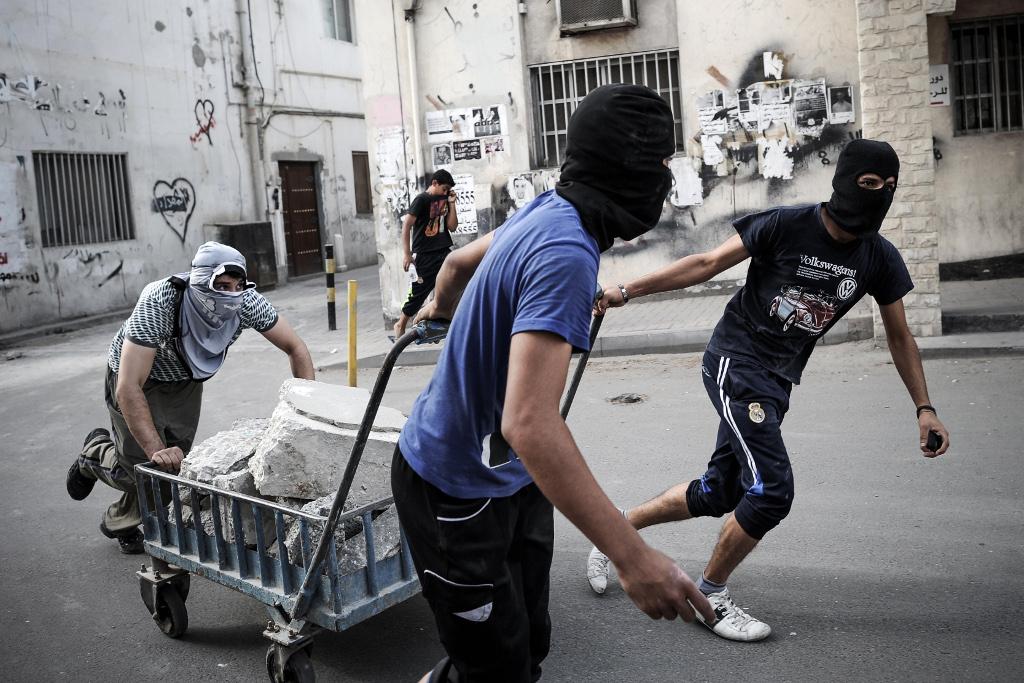Repression of Grand Prix protesters highlights shameful support of Bahrain
Bahraini protesters use a trolley to carry bricks during clashes with riot police following a protest against the Formula One Grand Prix on April 19, 2013 in the village of Sanabis, west of Manama.
RAMALLAH, West Bank — On Friday, April 19, thousands of Bahraini protesters were subdued by state violence when they assembled to demonstrate against the Formula One Grand Prix being held in Manama.
Pro-reform protesters from the February 14 Revolution Youth Coalition marched on the capital’s Pearl Roundabout. Clashes broke out when state security forces “fired tear gas and shotguns to disperse the protesters before they neared the area,” reported Al Jazeera English. Demonstrators responded by chucking petrol bombs and stones at police officers, chanting, “Your race is a crime” and “No, no to the blood formula.”
Elsewhere, thousands from the Shia opposition Al-Wefaq marched peacefully on the Budaya Highway, one of Bahrain’s main arteries connecting Shia-majority towns and villages to Manama.
Media reports note the massive increase in state security presence, adding that checkpoints were erected across the country to stifle the free flow of movement to and from areas neighboring the race venue.
In perfect harmony with the supposed democratic authenticity and respect for freedom of speech that the United States boasts to exclusively support in the Middle East, the government expelled three British journalists for allegedly violating “the laws and regulations” of the explicitly sectarian government. A statement released by the Interior Affairs Authority claimed that the expulsions were enacted to “ensure preserving the national security of Bahrain.”
This, of course, translates into preserving the status quo in a country that nauseatingly considers its sectarian majority, some 70 percent Shia Muslims, as mere footnotes and second-class citizens, all with the full-consent and inflated funding of the Obama administration.
This latest round of protests highlights the resounding hypocrisy of American support for the ruling class in Bahrain. Parking lot for the US Navy’s Fifth Fleet and a cringing island tucked between the Islamic Republic of Iran and the rich oil fields of Saudi Arabia, US foreign policy has long since dismissed authentic Bahraini democracy as incompatible with its own imperial designs on the region.
The country’s Shia majority is absurdly treated by the Sunni monarchy and its American financers as nothing more than a fifth column for Iran and Hezbollah rather than as equal citizens with legitimate demands.
As valiant rebellions rippled throughout the Arab region in early 2011, Pearl Roundabout was transformed into the focal point of Bahrain’s uprising. Massive popular protests resulted in the government inviting in a coalition of Western-armed military forces from member countries of the Gulf Cooperation Council to crush all visible dissent.
On March 16, 2011, in the midst of twilight, Washington’s closest Arab ally, Saudi Arabia, led the 5,000-man strong GCC forces into the peaceful encampments and used tanks and helicopters to launch a full-scale assault on unarmed protesters as they slept. Several were killed and over 400 bloodied and injured.
Although half-throated groans of “disapproval” and “disappointment” came from Washington, American complicity had never been clearer. A mere three days prior, then-US Secretary of Defense Robert Gates landed in Bahrain in a visit labeled “as a show of support for the ruling family.”
Though American officials had spent the previous three months praising the so-called “Arab Spring” in Egypt and Tunisia, where masses bravely dethroned brutal dictators who had been hailed as American allies for decades, they ostensibly had nothing meaningful to say about the virtually identical demands alighting from the heart of Bahrain.
In October 2012, international silence yet again reigned as the regime imposed emergency-style rules that targeted the restive Shia population and banned all forms of protest. By the time the ruling Al-Khalifa family was putting in place this suffocating stripe of martial law, more than 50 Bahrainis had been killed by government forces since the uprising’s initial outbreak in February 2011.
Well into Obama's second term as president, his administration’s position has hardly budged on Bahrain: despite occasionally issuing limp criticisms devoid of noteworthy content, the immense funding, arms, and full diplomatic support presses on unhindered.
Throughout the trajectory of the popular uprisings in the Middle East and North Africa in recent years, Western governments, along with corporate media outlets that have eagerly played chorus to the choir, have redrawn the map of the region and shifted the balance of power by crudely endorsing and co-opting certain revolutions and dismissing others as “sectarian” or “Islamist.” At the onset in early 2011, Egyptians and Tunisians were branded as iPhone-wielding democrats who craved Western-style parliamentary democracy, while Jordanians, Bahrainis, Palestinians, and others were written off out-of-hand.
This weekend — while mainstream media outlets dispatch from Manama nothing more than the news of the Formula One Grand Prix results — the collective will of Bahrainis will yet again fall wayside to the interests of an illegitimate regime and the foreign governments that foot its bills.
Patrick O. Strickland is a freelance journalist whose writing has appeared at Al Jazeera English, Electronic Intifada, International Socialist Review, Middle East Monitor and New Politics. Find him on Twitter: www.twitter.com/p_strickland_
Every day, reporters and producers at The World are hard at work bringing you human-centered news from across the globe. But we can’t do it without you. We need your support to ensure we can continue this work for another year.
Make a gift today, and you’ll help us unlock a matching gift of $67,000!
